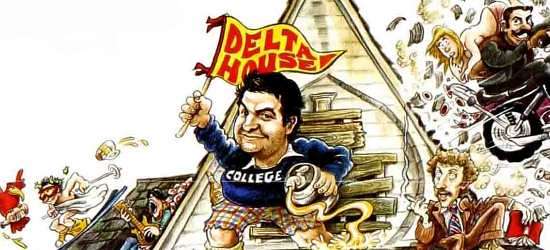 As this week marks the release of National Lampoon’s Animal House on blu-ray disc as well as the 33r anniversary of the film’s release in theaters, we thought it would be a good time to take a look at the script for a sequel to the classic comedy that was written but never made.
As this week marks the release of National Lampoon’s Animal House on blu-ray disc as well as the 33r anniversary of the film’s release in theaters, we thought it would be a good time to take a look at the script for a sequel to the classic comedy that was written but never made.
National Lampoon’s Animal House II
Second Draft Screenplay by Matty Simmons, Michael Simmons, Andrew B Simmons
Draft Date May 6, 1982
The early 1980s were a troubled time for the National Lampoon magazine. In the previous decade, the magazine burst into American pop culture with a slash-and-burn attitude towards comedy that perfectly suited the post-Watergate cynicism sweeping the country. In short time, it quickly became a household name and spun off a popular syndicated radio series. However, the magazine’s popularity didn’t really reach its zenith until the release of the film National Lampoon’s Animal House in the summer of 1978.
But as the cynical 70s gave way to the 1980s and Ronald Reagan’s vision of the country as a shining city on a hill, Nat Lamp (as it is often abbreviated) found its fortunes floundering. The magazine’s three founders – Doug Kenney, Henry Beard and Robert Hoffman – had accepted a buyout clause in their contract back as far back as 1975 and by the end of the decade, many of Nat Lamp‘s original staff had already moved on. Some, such as the brilliant Michael O’Donoghue and Anne Beatts, had gone to work in television, helping to launch a little weekend, late-night sketch show for NBC called Saturday Night. Others went west, lured by the big money to be found in Hollywood.
The magazine’s circulation was decreasing and it still hadn’t found a way to follow up on the success of Animal House at the movies. National Lampoon’s Vacation (1983), which screenwriter John Hughes based on one of his Lampoon short stories, was still a year away from being released when Animal House producer and Nat Lamp publisher Matty Simmons decided that the best way to reinvigorate the cinematic brand name of National Lampoon would be returning to Faber College for a second Animal House film.
This would not be the first time an Animal House sequel was considered. After the film became a hit in the summer of 1978, a follow up story was conceived. It was set five years after the events of the first film in 1967’s “Summer of Love” and would feature the Deltas coming together to attend the marriage of their fraternity brother Pinto in Haight-Ashbury, San Francisco. Animal House co-screenwriter Chris Miller got as far as writing a treatment for the film with Lampoon writer John Weidman, but Universal passed on the idea, reportedly because the recently released American Graffiti sequel also had some similar elements concerning hippies and the Summer of Love and had died at the box office.
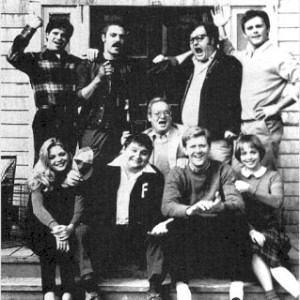 There was also an attempt to bring Animal House to television in 1979 as the series Delta House which failed as well. Probably inspired by the success CBS had with bring Robert Altman’s anti-war comedy M*A*S*H to America’s living rooms, Delta House was a half-hour sitcom shot in the style of the original film and not on the rather flat, fake sets that most sitcoms were produced on. And while there was no studio audience, much like the early seasons of M*A*S*H, there was a laugh track, supposedly to cue the audience at home as to when they should laugh. The show featured the return of Animal House cast members John Vernon (Dean Wormer), Stephen Furst (Flounder), Bruce McGill (D-Day), and James Widdoes (Hoover) and the pilot episode (“The Legacy,” airdate January 18, 1979) was written by Animal House‘s scriptwriting trio of Harold Ramis, Doug Kenney and Miller.
There was also an attempt to bring Animal House to television in 1979 as the series Delta House which failed as well. Probably inspired by the success CBS had with bring Robert Altman’s anti-war comedy M*A*S*H to America’s living rooms, Delta House was a half-hour sitcom shot in the style of the original film and not on the rather flat, fake sets that most sitcoms were produced on. And while there was no studio audience, much like the early seasons of M*A*S*H, there was a laugh track, supposedly to cue the audience at home as to when they should laugh. The show featured the return of Animal House cast members John Vernon (Dean Wormer), Stephen Furst (Flounder), Bruce McGill (D-Day), and James Widdoes (Hoover) and the pilot episode (“The Legacy,” airdate January 18, 1979) was written by Animal House‘s scriptwriting trio of Harold Ramis, Doug Kenney and Miller.
But despite initially good ratings and five of its 13 episodes being written by Nat Lamp alum John Hughes, the series only lasted four months. Reportedly producers Simmons and Ivan Reitman had quickly become burned out with arguing with network executives over the content of the show.
Perhaps looking forward to producing an Animal House project without the strictures imposed by television, Simmons decided to go ahead and start developing a sequel somewhere in late 1981/early 1982. There was just one problem- The original writers of Animal House were unavailable. Miller was off working on Anne Beatts’ television show Square Pegs, which, for better or worse, gave the world Sarah Jessica Parker. Harold Ramis was off working on SCTV. And Doug Kenney was dead, having died under mysterious circumstances with no one knowing if he had accidentally fallen or purposefully jumped off the side of a mountain in Hawaii where he was vacationing following the completion of his work on the comedy Caddyshack.
So Simmons, perhaps bolstered by the fact that he shared a writer’s credit for two episodes of Delta House, took it upon himself to pen the screenplay in conjunction with his sons Michael and Andrew B Simmons.
It’s been five years since the brothers of Delta House wrecked havoc on the Annual Faber College Homecoming Parade and several members of the frat decide that it might be safe to venture back for a weekend visit to their old college haunts. Arriving, though, they are horrified at the changes that their beloved fraternity has undergone. After keeping it closed for half a decade, Dean Wormer has allowed Delta House to reopen, only to fill it with a collection of nerds and geeks – the type to never cause the problems that have been associated with the Deltas in the past. And so Boone, Otter, D-Day, Pinto and Flounder take it upon themselves to instruct their new frat brothers in their fraternity’s infamous history. They almost immediately run afoul of Wormer and the members of Omega House, lead by their old nemesis Doug Neidermeyer. Wormer wants to run the returning Deltas off campus before they sour filthy rich alumni Milton Vanderslaag on donating more money to the college. Things escalate to the point where the Deltas enter into a bet with Vanderslaag, Wormer and the Omegas which puts the future existence of Delta House at risk. To win the bet, all they have to do is best the Omegas in two out of three competitions, contests that the Deltas really aren’t suited for at all.
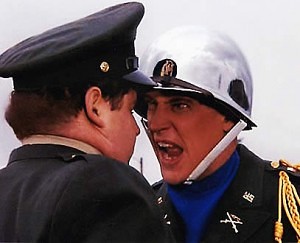 To be honest, when I started reading this I went in with severely lowered expectations. Animal House is a classic and is one of my few favorite comedies that doesn’t feature the Marx Brothers, another group of outsiders who frequently thumbed their noses at the uptight establishment. And there are moments where I found myself liking what I was reading. But when I put down the script at the end, I had to wonder if my positive response was more due to the affection that I hold for the characters, because this screenplay has a lot of flaws.
To be honest, when I started reading this I went in with severely lowered expectations. Animal House is a classic and is one of my few favorite comedies that doesn’t feature the Marx Brothers, another group of outsiders who frequently thumbed their noses at the uptight establishment. And there are moments where I found myself liking what I was reading. But when I put down the script at the end, I had to wonder if my positive response was more due to the affection that I hold for the characters, because this screenplay has a lot of flaws.
Giving credit where it’s due, the Simmonses do manage to approximate the voices of most of the characters. A line from Flounder, Boone or Otter usually reads like something they’d say. Of course, this could partially be attributed to the fact some of the characters’ lines and actions are just reprises of favorite bits from the first film. When Boone and Otter are at center field at the start of the climactic football game, they once again do their “Eric Stratton, damn glad to meet you”/”That was Eric Stratton. He was damn glad to meet you.” bit from the first film’s opening rush party scene.
But this also leads us to the first of the script’s big failing – the pervasive feeling of familiarity. The Deltas trip to a honkytonk roadside bar is an obvious callback to the famous bar scene in the first film. And having your heroes’ fortunes rest on the outcome of a football game is a cliche that dates back as far as the Marx Brother’s Horse Feathers and Harold Lloyd’s 1925 comedy The Freshman. One of Hughes’ Delta House scripts also centered on a football game and I have to wonder if Simmons partly pinched the idea from here.
The next of the big problems with the script lies in its comedic set pieces. Many of the original film’s comic moments were drawn from the screenwriters own college experiences or stories they heard from friends. For all their outrageousness, there’s still the element of reality to the proceedings. (Well, with perhaps the exception of elements of the Homecoming Parade at the end of the film, but by this point, we’re along for the ride.) But here, the writers are just pushing things a little too far past the realm of probability for the sake of a laugh. In the scene where the Deltas cut some wires to a radio transmitter tower owned by the college, electricity suddenly sparks everywhere and then the whole tower just collapses. In another sequence, D-Day laces the punch at a Homecoming function and soon everyone is shedding their clothes to skinny dip in the river or to have sex with each other along the shore. These feel too broad and come across as cartoonish.
The worst transgression in this category is when Dean Wormer and the Neidermeyer brothers set fire to the Deltas’ frat house all the while Boon and Katie are having makeup sex in a room upstairs, oblivious to the conflagration around them. They even continue after they realize that the House is on fire! It stretches believability so badly that if he had a mustache, I’d be expecting Wormer to be twirling its end.
The script is also too scattered and unfocused. It often loses some its characters for long stretches of time, most specifically the new group of Deltas. Also, it doesn’t seem to know what story it wants to tell. Is the film about about the classic Deltas once again besting their rivals at the Omega House or is it about the Deltas inducting their new generation of frat brothers into the fine traditions of partying and chasing girls? At 127 pages, the script is far too long by trying to do both and ultimately each storyline just feels diluted.
There’s also a question about the underlying logic of the script that I couldn’t get out of my head. At the end of the first film, the Deltas sabotaged the Homecoming Parade in retaliation for Dean Wormer flunking them out of Faber and getting their fraternity charter revoked. And yet, just a couple of years later they’re allowed to stroll back on campus for the Homecoming weekend? I would imagine that Wormer’s first act upon seeing anyone of them set foot on the college grounds should have been to pick up the phone and call the police. Certainly the statute of limitations on their actions (destruction of property, inciting a riot, etc) couldn’t have expired yet.
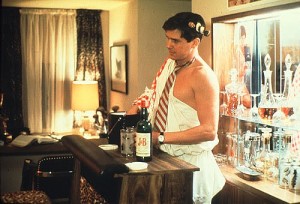 If you’re looking for just a pleasant reunion with the characters you grew to like and hate in the original film, you should know that there are some conspicuous absences amongst the returning Deltas and Omegas. Belushi’s Bluto is the most obvious, but also the most understandable as the actor died just a few months before the draft date on this script. (This leads me to believe that perhaps the more prominent role of D-Day in the script is the result of giving his character much of the action that may have originally been planned for Bluto.) Stork’s absence is similarly understandable due to Kenny’s death. With Miller not participating in the writing, the character he played in the film, Hardbar, is nowhere to be found. On the Omega side, Doug Neidermeyer’s right hand man Greg Marmalade (played by James Daughton) is also missing, his role filled by Doug’s younger brother Brad.
If you’re looking for just a pleasant reunion with the characters you grew to like and hate in the original film, you should know that there are some conspicuous absences amongst the returning Deltas and Omegas. Belushi’s Bluto is the most obvious, but also the most understandable as the actor died just a few months before the draft date on this script. (This leads me to believe that perhaps the more prominent role of D-Day in the script is the result of giving his character much of the action that may have originally been planned for Bluto.) Stork’s absence is similarly understandable due to Kenny’s death. With Miller not participating in the writing, the character he played in the film, Hardbar, is nowhere to be found. On the Omega side, Doug Neidermeyer’s right hand man Greg Marmalade (played by James Daughton) is also missing, his role filled by Doug’s younger brother Brad.
But at the end of the day and this script’s 127 pages the question remains – Is this a necessary story to tell? We already know what the future holds for the Deltas and the Omegas after the Fall of 1962. Do we need to see more reasons why no one will mourn Niedermeyer when he eventually gets fragged by his own troops in ‘Nam? Do we need to see Boone and Katie having marital problems or Flounder on his way to becoming a counselor? Not really. And while we may remain friends with those we meet in college for the rest of our lives, I think that this script teaches us that perhaps it is not the wisest thing to only dwell on one’s past glories.




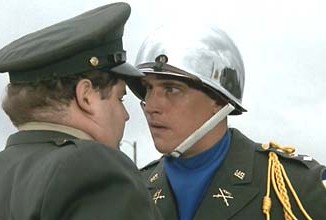
[…] Image: FilmBuffOnline […]
Here’s the link of the unproduced “National Lampoon’s Animal House II” that some Reddit user had found on Google Drive:
https://drive.google.com/drive/folders/1SSs-5TfX3QBvEzYZSgNBM-e2OnPb8O9_?usp=sharing
How did I found this link? From the following screenshot talking about another Reddit user wanting to find the screenplays to “National Lampoon’s Animal House”.